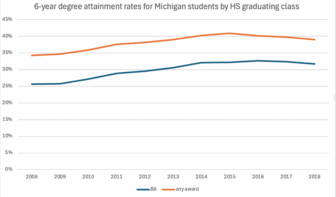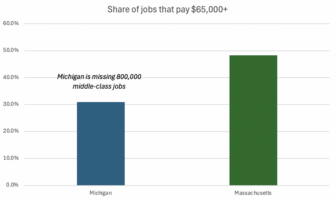On Wednesday ![]() we released a report detailing our recommendations for how to redesign Michigan’s education system, birth through college. Our recommendations are based on the understanding that to thrive in today’s ever-changing knowledge economy, students need to develop a range of skills that go far beyond what’s measured by standardized tests, and have the opportunity to earn a four-year degree. And today, only affluent students in prestigious private schools and wealthy suburban districts are offered the education needed to develop the right skills and earn the right degrees, while everyone else is offered something less. Our report takes on the question of what it would take to provide for all children the type of education affluent children receive.
we released a report detailing our recommendations for how to redesign Michigan’s education system, birth through college. Our recommendations are based on the understanding that to thrive in today’s ever-changing knowledge economy, students need to develop a range of skills that go far beyond what’s measured by standardized tests, and have the opportunity to earn a four-year degree. And today, only affluent students in prestigious private schools and wealthy suburban districts are offered the education needed to develop the right skills and earn the right degrees, while everyone else is offered something less. Our report takes on the question of what it would take to provide for all children the type of education affluent children receive.
Early childhood
This education starts at birth. Since the early 1980s, measures of kindergarten readiness have improved for all income groups, but have skyrocketed for children raised in top quartile families. Researchers believe this is because these families are dedicating far more resources to their children than low and middle-income families, both in terms of time and money. They read and talk with their children more often, engage in “serve-and-return” interactions, and invest in high-quality child care, pre-K, and enrichment activities.
We need to start by replicating for all kids the type of early childhood experiences wealthy children receive. In the report we offer a range of recommendations, but broad access to high-quality early childhood care/education is essential. There are too few high-quality providers in Michigan (just 2% of childcare providers have a 5-star rating), and non-affluent families lack access to early care/education in general, and access to high-quality early care/education in particular.
And we don’t provide these families much help. Michigan is a national laggard in early childhood investment. According to a report released last year by Public Sector Consultants, Michigan offers childcare subsidies to only the poorest families (2nd lowest threshold in the country), and provide extremely low subsidies (4th lowest in the country), making it impossible to use the subsidy for high-quality care. We also provide no state funding for pre-K for 3-year-olds.
The state needs to push all providers to improve quality, and bring to bear the resources needed to employ highly credentialed staff and lower student-to-staff ratios.
K-12
In K-12, we need to shift from a system built around improvement on a narrow range of math and reading skills, to a system built around developing the wide range of skills students will need to be successful in an ever-changing economy. The best definition we’ve found for this set of skills comes from the book Becoming Brilliant, which labels these skills the 6 Cs: collaboration, communication, content, critical thinking, creativity, and confidence.
To develop the 6 Cs in students, we need models of education that promote a style of instruction in which students are asked to engage deeply with content, come up with answers on their own, be self-directed, collaborate, and create final written and oral products. These models are generally known as project-based, inquiry-based, or deeper learning models. It’s this model we should have in our minds when we imagine 6 Cs instruction: discussion over lectures, discovery over rule-following, and performance-based assessments over high-stakes tests. This is the dominant model of education in elite private schools and wealthy suburban districts, while schools serving non-affluent students spend their time and energy drilling students on math and reading skills in preparation for standardized tests.
Encouraging all schools to teach towards the 6 Cs will require system-wide change. We need to move away from annual high-stakes testing in math and reading, which has turned so many classes into nothing more than test prep, and robbed many students of a broad, engaging curriculum that could hook them into education, and build the full range of skills needed for success in life.
Instead of test scores, schools should be held accountable to their students’ long-term academic success and educational attainment. The tests we do use should be built around open-ended response, essays, and multi-step problem solving, which would push schools to develop a far broader range of student competencies.
These changes need to matched with increased funding for non-affluent students. Part of what enables affluent districts and elite private schools to deliver a 6 Cs education is that they spend far more than non-affluent districts. This money goes towards hiring great teachers, reducing class sizes, developing high-quality curriculum, and offering a full suite of extracurricular activities. Our funding system needs to address this funding gap, so that non-affluent schools can afford the same things. Massachusetts, the national leader in K-12 education, provides schools an additional grant up to $3,500 per low-income student they serve. Michigan needs to follow their lead.
Higher education
Finally, we need to increase completion rates in higher ed. Many of our open-access public universities in Michigan have graduation rates under 50%, and all of the metro-Detroit community colleges have associate’s degree completion rates of under 20% for first-time, full-time students. There’s an emerging playbook of best-practices on student success from institutions and programs across the country who have made huge gains. We need to make sure Michigan institutions are following that playbook.
A big part of this is ensuring they have the resources needed to support students. We’ve cut $1 billion in state spending (in real terms) from our public universities since 2001-02, leading tuition to skyrocket (up 400% at MSU from 1985 to today), and preventing meaningful investments in student success. In our report we recommend increasing state appropriations to 2001 levels, as well as dramatically increasing state support for need-based financial aid grants for non-affluent students. We need far more students to cross the finish line, and we need to give them a lot more help in getting there.
Success in today’s economy requires a set of skills that goes far beyond math and reading proficiency, and a four-year college degree provides the surest path to a well-paying career. These skills and those degrees can no longer only go to the affluent, but must be available to all Michigan children. We hope our report provides some ideas for how we can achieve this goal.







